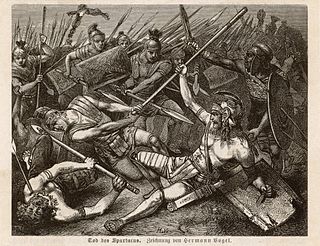
Gnaeus Pompeius Magnus, known in English as Pompey or Pompey the Great, was a general and statesman of the Roman Republic. He played a significant role in the transformation of Rome from republic to empire. Early in his career, he was a partisan and protégé of the Roman general and dictator Sulla; later, he became the political ally, and finally the enemy, of Julius Caesar.

The 1st century BC, also known as the last century BC and the last century BCE, started on the first day of 100 BC and ended on the last day of 1 BC. The AD/BC notation does not use a year zero; however, astronomical year numbering does use a zero, as well as a minus sign, so "2 BC" is equal to "year –1". 1st century AD follows.

Year 73 BC was a year of the pre-Julian Roman calendar. At the time it was known as the Year of the Consulship of Lucullus and Longinus. The denomination 73 BC for this year has been used since the early medieval period, when the Anno Domini calendar era became the prevalent method in Europe for naming years.

This article concerns the period 59 BC – 50 BC.
This article concerns the period 79 BC – 70 BC.

Quintus Sertorius was a Roman general and statesman who led a large-scale rebellion against the Roman Senate on the Iberian Peninsula. Sertorius became the independent ruler of Hispania for most of a decade until his assassination.

The Third Servile War, also called the Gladiator War and the War of Spartacus by Plutarch, was the last in a series of slave rebellions against the Roman Republic known as the Servile Wars. This third rebellion was the only one that directly threatened the Roman heartland of Italy. It was particularly alarming to Rome because its military seemed powerless to suppress it.

The gens Licinia was a celebrated plebeian family at ancient Rome, which appears from the earliest days of the Republic until imperial times, and which eventually obtained the imperial dignity. The first of the gens to obtain the consulship was Gaius Licinius Calvus Stolo, who, as tribune of the plebs from 376 to 367 BC, prevented the election of any of the annual magistrates, until the patricians acquiesced to the passage of the lex Licinia Sextia, or Licinian Rogations. This law, named for Licinius and his colleague, Lucius Sextius, opened the consulship for the first time to the plebeians. Licinius himself was subsequently elected consul in 364 and 361 BC, and from this time, the Licinii became one of the most illustrious gentes in the Republic.
Crixus was a Gallic gladiator and military leader in the Third Servile War between the Roman Republic and rebel slaves. Born in Gaul, he was enslaved by the Romans under unknown circumstances and trained as a gladiator in Capua. His name means "one with curly hair" in Gaulish.
Quintus Caecilius Metellus Pius was a general and statesman of the Roman Republic. His father Metellus Numidicus was banished from Rome through the machinations of Gaius Marius. He, because of his constant and unbending attempts to have his father officially recalled from exile, was given the agnomen (nickname) Pius.
This is a historical timeline of Portugal.

Gnaeus Cornelius Lentulus Clodianus was a Roman politician and general who was one of two Consuls of the Republic in 72 BC along with Lucius Gellius. Closely linked to the family of Pompey, he is noted for being one of the consular generals who led Roman legions against the slave armies of Spartacus in the Third Servile War.
Lucius Gellius was a Roman politician and general who was one of two Consuls of the Republic in 72 BC along with Gnaeus Cornelius Lentulus Clodianus. A supporter of Pompey, he is noted for being one of the consular generals who led Roman legions against the slave armies of Spartacus in the Third Servile War.

The Sertorian War was a civil war in the Roman Republic fought from 80 to 72 BC between two Roman factions, one led by Quintus Sertorius and another led by the senate as constituted in the aftermath of Sulla's civil war. The war was fought on the Iberian peninsula and was one of the Roman civil wars of the first century BC. The Sertorians comprised many Roman exiles from the Sullan proscriptions led by Sertorius, who fashioned himself proconsul, and native Celts, Aquitanians, and Iberians.

Spartacus was a Thracian gladiator (Thraex) who was one of the escaped slave leaders in the Third Servile War, a major slave uprising against the Roman Republic.

Spartacus: War of the Damned is the third and final season of the American television series Spartacus, a Starz television series, which follows Spartacus: Vengeance. The series was inspired by the historical figure of Spartacus, a Thracian gladiator who, from 73 to 71 BC, led a major slave uprising against the Roman Republic. It premiered on January 25, 2013, and concluded on April 12, 2013.
Quintus Arrius was a Roman praetor in 73 BC. In the next year he should follow Gaius Verres as governor of Sicilia. But first he had to support the consuls Lucius Gellius Publicola and Gnaeus Cornelius Lentulus Clodianus in the Third Servile War against the leaders of the rebellious slaves, Spartacus and Crixus. In the battle in which Arrius conquered Crixus 20,000 slaves are said to have been killed; but Arrius was soon after defeated by Spartacus. A scholiast on Cicero said that Quintus Arrius thereafter went to Sicily to take over this province from Verres, but died on the way there. However, the scholiast does not seem to be well informed, and the veracity of his assertion is doubtful. It only can be said that Quintus Arrius did not govern Sicilia.

The Battle of Picenum was one of the major battles of the Third Servile War, between the slave army of Spartacus and the combined consular forces of the Roman Republic led by the two consuls Lucius Gellius and Gnaeus Cornelius Lentulus Clodianus. It took place in Picenum region in 72 BC. It was a victory for Spartacus, and it proved to be his greatest triumph of the war.












